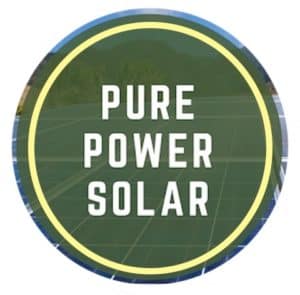Home solar panel installation has surged due to their reduced costs over time in addition to solar tax credits.
However, the majority of home solar installations in the U.S. are grid-tied.
This setup alone will not allow you to have backup power during a power outage.
A generator is needed with solar panels because they are connected to a community grid that shuts down during any electrical outages. The panels cannot draw any power from the grid during that time. Using a generator will keep power running to essential appliances for the duration of the outage.
There is much more you need to learn about why you need a generator with solar panels.
From the reasons why your panels are not enough on their own, to the types of generators that are best for your home, read on to find out more.
Will Solar Panels Power My House During a Power Outage?
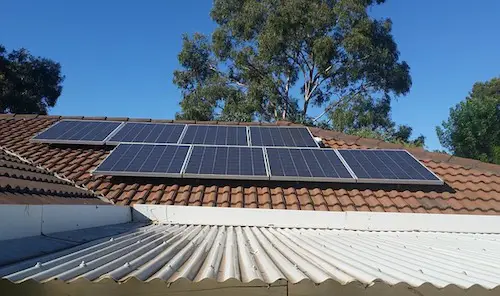
Solar panels will not power your house during a power outage because they are most likely grid-tied. The only way solar panels can power your house during a blackout is if you keep their energy stored in batteries.
You have invested your money into a solar-powered system for your home to generate your own electricity and save on a monthly power bill.
So, since you have solar panels, you should have electricity all the time, no matter what, right?
The answer is no because your home is likely connected to the same power grid that you share with your neighbors.
Any electricity that is generated by your and your neighbors’ solar panels, is all stored on a local grid that is designed to manage the power as needed.
When a severe storm hits and the power goes out, you will be left in the dark as well. This is the major reason why you need a backup generator to be able to power your necessary appliances until the power is restored.
There are some exceptions to this fact, however, depending on what other steps you have already taken to ensure your home remains powered during a storm.
In addition to having a backup gas generator, there are two other ways to keep the lights on during a blackout in a home with solar panels.
- You may be able to add backup solar batteries to your home’s system if it is capable.
- Purchase and use a generator that is solar-powered, rather than a traditional gas generator.
The options listed above are great alternatives to using a traditional gas generator.
However, the purchase of a backup solar battery or solar generator is quite expensive compared to the price of a gas-powered generator.
Similar: Solar Generator vs Solar Panels (With Battery)
What Type Of Generator Do You Need?
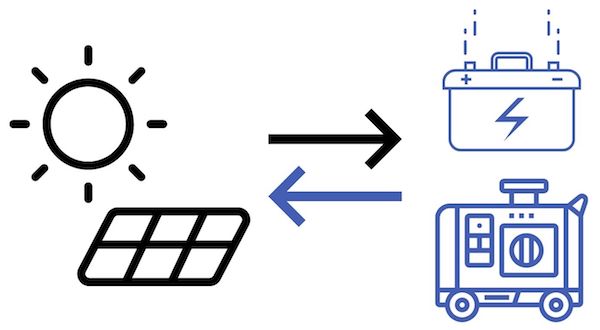
Determining what type of generator you need to power your solar-paneled home during a blackout is dependent upon a few things.
First, the size of your home is a major factor when choosing a backup generator.
You need to make sure that the generator you purchase is capable of supplying sufficient power to your home during the duration of the blackout.
Below I’ve compiled four main types of backup generators to give you an idea of their benefits and drawbacks.
| Generator Type | Generator Description | Pros | Cons |
|---|---|---|---|
| Solar Generator | A pre-made system with all components packaged together | – Various sizes – Minimal assembly required | – Cannot power an entire home – Larger systems are expensive |
| Solar Power System | Custom system tailored for home w/ individual components (DIY solar generator) | – Can provide full home backup power – Components can be easily replaced if needed | – Most likely need an electrician to install it for you – Larger systems are expensive |
| Portable Gas Generator | Gas generator on wheels | – Sufficient power for home – Inexpensive compared to solar options | – Fuel costs over time can be expensive – Need to keep it outside when in use (fumes) |
| Standby Gas Generator | Gas generator installed on your property | – Can be used as UPS – Can provide full home power | – System is expensive – Fuel costs over time can be expensive |
Gas Generators
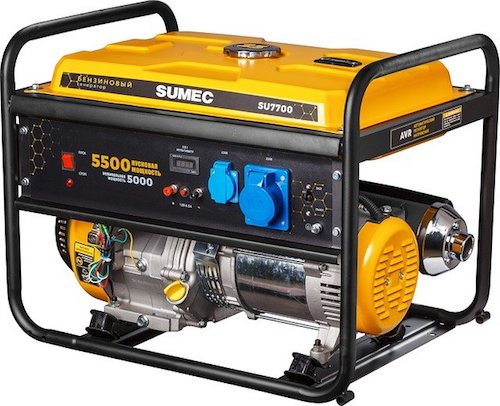
For most homes, a gas generator with 7,500 watts or above will be big enough to keep power running to your fridge, lights, etc. This will help ensure that your food does not spoil in your refrigerator and freezers.
This size generator should also give you enough juice to power the lights in your home and charge your phones and other needed small appliances.
Below you’ll find different models of both portable and standby gas generators along with their basic specifications.
Portable Gas Generator Models & Specs
| Model | Cost | Power Output | Duration of Power |
|---|---|---|---|
| DUROMAX Dual Fuel Gasoline/Propane Portable Home Power Back Up Generator | $1400 | 9,500W continuous; 12,000W peak | 7.2 hrs (half load w/ 40 lb propane tank); 8.8 hrs (half load w/ gasoline) |
| Westinghouse WGen7500 Gas Powered Portable Generator with Transfer Switch Outlet for Home Backup | $680 | 7,500W continuous; 9,500W peak | 11 hrs (half load w/ gasoline) |
| DeWALT Gas-Powered Portable Generator with Premium Engine | $650 | 4,000W continuous; 4,500W peak | 10.5 hrs (half load w/ gasoline) |
Standby Gas Generator Models & Specs
| Model | Cost | Power Output | Duration of Power |
|---|---|---|---|
| Generac 22000-Watt (LP) / 19500-Watt (NG) Standby Generator with Automatic Transfer Switch | $5,700+ | 20,100-30,000W (liquid propane); 15,100-20,000W (natural gas) | Indefinite w/ gas lines |
| Briggs & Stratton 12000-Watt (LP)/10800-Watt (NG) Standby Generator with Automatic Transfer Switch | $3,850+ | 8,100-15,000W (liquid propane & natural gas) | Indefinite w/ gas lines |
You can find the right size gas generator for your home with this calculator from Generac.
There are a few downsides to purchasing a gas-powered backup generator. Here are some other drawbacks of purchasing a gas generator:
- Fuel-powered backup generators put off a very strong and unpleasant odor due to the fact that they run on gasoline.
- Gas-powered generators are also very loud while running. This means that for however long your power outage lasts, you will have to endure the sound of your generator working.
- Using a gas-powered generator adds to the amount of pollution that is already in the air. This may be a huge drawback for those who chose solar to lessen their carbon footprint on our world.
Also, keep in mind that the major drawback of choosing this option is that you will need enough fuel on-hand to keep this generator working.
Solar Generators, Batteries, and More
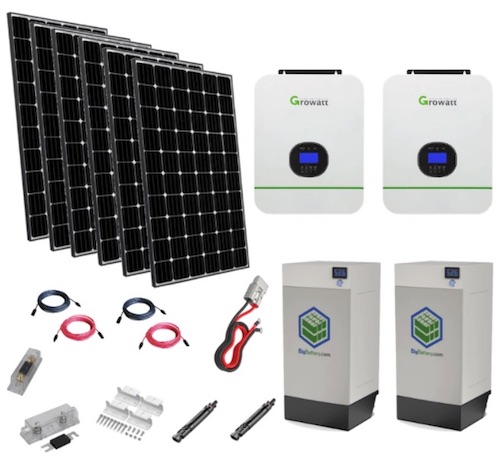
Now that we have discussed the use of a gas generator as a backup for loss of power, even with solar panels, it is time to explore some other options.
If you are currently a homeowner with solar panels, you can protect yourself from potential power outages with the use of an installed solar battery. The type of battery you purchase depends upon the specifications of your panels and how much you are willing to pay.
Ultimately, you can purchase any brand of battery, so long as it is compatible with your current solar panel operating system.
Similar: What Kind of Solar Panel Do You Need to Charge a 12v Battery?
You can even install a UPS, which detects power outages when they occur and switches your solar panel system from operating on the community grid to operating solely only to power your home. This ensures that you can maintain power, even through lengthy storm systems, at home.
The following are examples of complete solar power systems. These kits include solar panels and all other necessary components for off-grid power.
Solar Power System Kits & Specs
| Model | Cost | Power Output | Duration of Power |
|---|---|---|---|
| Complete Off-Grid Solar Kit – 12,000W 120/240 Output 48VDC / [14Kwh Battery Bank] + 4,230 Watts Solar | [OGK-1] | $8,000-$15,000 | 12,000W continuous | 2.33 hrs (half load w/ full battery w/o solar recharging) |
| Complete Off-Grid Solar System 400 Watts Solar / 4,000W 120/240V Output / 12VDC | [OGK-8] | $3,200-$4,000 | 4,000W continuous | 2.4 hrs (half load w/ full battery w/o solar recharging) |
Moving on, you also have the option of purchasing many varieties of solar generators that are currently on the market.
The majority of solar generators available at this time are aimed more towards partial home backup, rather than powering your entire house.
That being said, these are still viable options to consider while shopping around for your generator.
Solar Generator Kits & Specs
| Model | Cost | Power Output | Duration of Power |
|---|---|---|---|
| Bluetti AC200 [MAX] 6,000 [Quad Kit] Portable Solar Generator + 4 x 200W 12V Mono Solar Panels | Complete Solar Kit | $6,500 | 2,200W continuous; 4,800W peak | 5.59 hrs (half load w/ full battery w/o solar recharging) |
| Titan Solar Generator + 5 x 100 Watt Solar Panels | Complete Solar Generator Kit | $4,200 | 2,000W continuous; 6,200W peak | 2 hrs (half load w/ full battery w/o solar recharging) |
The size of your home is a large factor when deciding whether to purchase a gas or solar generator.
The amount of money you are willing or able to spend is just as important, especially when considering a solar generator system.
This is because they come in several different sizes.
Weather is another important factor if you live somewhere more prone to storms and blackouts.
Other Options To Consider
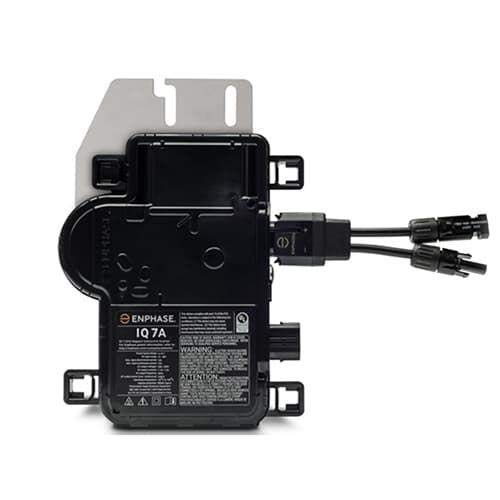
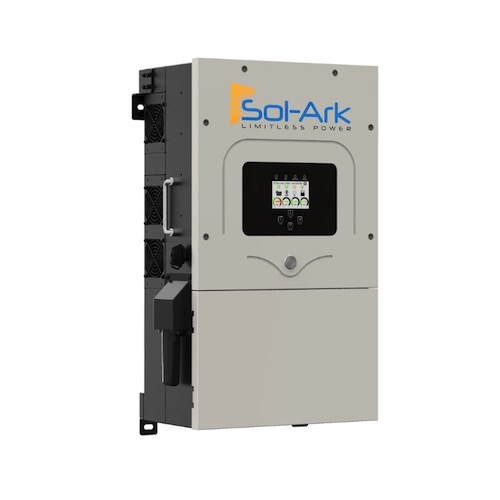
In addition to purchasing a gas or solar generator, there are a few other options you can look into.
IQ8 Microinverter(s) – Enphase
Enphase is a solar panel installer that also creates battery storage systems (similar to Tesla’s PowerWall). They created the IQ8 Microinverter, which converts the DC output from solar panels into AC power for the grid (grid-tied inverter).
Unlike previous Microinverters from Enphase, the IQ8 also acts as an off-grid inverter. It can detect grid outages and switch from supplying the grid to supplying your home with power.
In addition, the IQ8 doesn’t need to run the solar panels’ power to a battery in order to run appliances inside the home.
Without the need for a battery, the IQ8 can adjust its output to appliances and keep them powered for as long as sufficient sunlight is available.
Hybrid Inverter (Ex: Sol-Ark 12K)
As opposed to a solar inverter, a hybrid inverter can help your home operate successfully throughout the duration of even some of the longest power outages.
The system is essentially the CEO of sorting power from different sources, which can heavily reduce your risk of losing power at home even when the grid shuts down.
“A hybrid inverter (sometimes referred to as a multi-mode inverter) is an inverter which can simultaneously manage inputs from both solar panels and a battery bank, charging batteries with either solar panels or the electricity grid (depending on which is more economical or preferred). Their capabilities may go beyond this however – some devices also handle inputs from wind turbines, generators and other power sources.”
– solar choice
The following power sources can connect to the Sol-Ark 12K hybrid inverter:
- Solar panel arrays (up to 13kW)
- Gas generators (up to 12kW)
- 48V batteries
- Grid power
Another feature that benefits someone with one of these is peak shaving.
This means that the hybrid inverter will utilize off-grid sources of energy connected to it (direct solar, battery power, gas generator) to reduce the cost of utilities throughout the day when demand is high as well as utility costs.
Plus, it can sell solar power back to the grid.
The Sol-Ark hybrid inverter doesn’t need a battery to function, but it can be a great benefit to have powerful batteries as a backup power supply.
A hybrid inverter converts DC to AC power as well as AC to DC power.
Going Completely Off Grid
Arguably the most expensive option, going off the grid makes your home self-sustainable and provides access to any energy you produce whenever you need it.
You will have to put a considerably larger amount of planning, time, and money into going off-grid.
The size of your home is a large factor when deciding whether to purchase a generator or go with another option.
The amount of money you are willing or able to spend is just as important, especially when considering an inverter system.
Weather is another important factor if you live somewhere more prone to storms and blackouts.
Conclusion
At the end of the day, the last thing you want is to be left without power during a severe storm. You may decide to purchase a solar generator or go with a traditional gas generator.
Consider all the options listed above, and your own personal factors, before making that choice.
Whatever your final decision may be, remember that solar panels alone will not keep your home lit and running after a severe storm hits.
Do your research and find the best option for your family, so that when the next storm or emergency comes your way, you are prepared!
For solar generator options for your house, I recommend reading my article on this topic.
In the article, I show a variety of options available on the market and select the best ones from small to large. Check it out here: 9 Best Solar Generators for Home Use (Small to Large).
